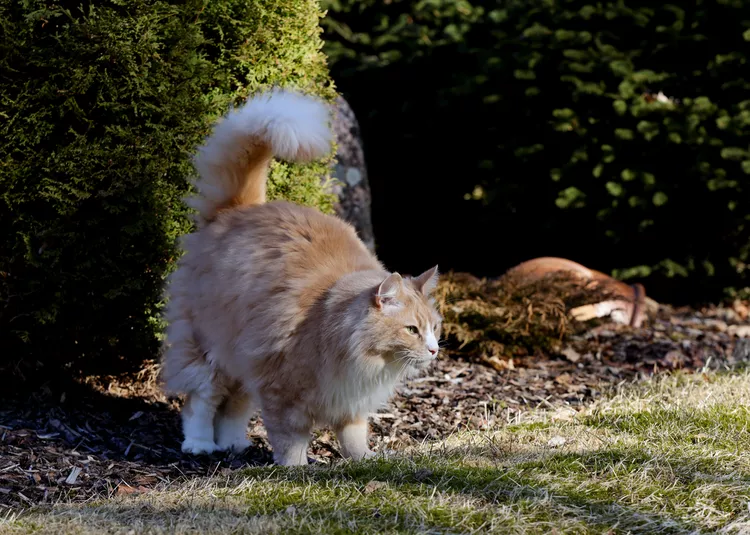Why Do Male Cats Spray?

Cats speak a different language than humans so their behaviors are often actually their ways of trying to say something. Urine spraying is one of these such behaviors but unfortunately it isn't something any cat owner likes to see, much less clean up. Knowing why your cat may be spraying and what you can do about it can help ease some stress and frustration for both you and your cat.
What Is Urine Spraying?
Cats may urinate outside their box and practice inappropriate elimination but when they pee vertically and not on the floor or other horizontal surfaces it is referred to as spraying or marking. When a cat marks, urine is sprayed against a wall, table leg, couch, or other surface as a cat stands, raises its tail, shakes, and backs up to the item. It is typically a small amount of urine that sprays out instead of a steady stream that is produced during a normal, squatting, urination. But while the amount may be small, the smell is often not. Both male and female cats can spray, however, the behavior is more common in males, and only intact (un-neutered) males will have the especially pungent "Tom Cat" odor to their urine.
Why Do Male Cats Spray Urine?
A cat may spray urine for a variety of reasons but these reasons can typically be classified as either a response to an environmental stressor or a territorial behavior. Environmental stressors may include new people, such as a baby, in the home, new animals, such as a puppy or other cat, construction or remodeling in your home, boredom with its feeding regimen or playtime, litter concerns such as scented or dirty litter, a litter box that it doesn't like, such as a covered or automatic cleaning box, and more. Basically, if a cat is upset or stressed about something it may spray but it may also be hard for a cat owner to know what their cat isn't happy about.
Territorial reasons for spraying can include outdoor cats or other wildlife that your cat can see or hear indoors, new cats in the home creating a sense of competition, and/or 'marking' to claim certain territories as his own. Spraying tells other cats that the space has already been claimed by them and they are not to be messed with.
Can Male Cats Still Spray After Being Neutered?
Neutering a male cat will dramatically decrease the likelihood that it will spray, as most causes of this behavior are driven by testosterone, but a small percentage of cats will still spray after having this procedure performed. According to the Cornell Feline Health Center, 10% of cats will continue to spray even after they have been neutered. Neutering a cat especially helps to decrease territorial spraying since less hormones are influencing them, but if your cat is stressed or upset about something in its environment, it is still physically capable of spraying.
How to Stop Urine Spraying
All types of inappropriate elimination can be difficult and frustrating to stop but there are a few things you can do.
- Neutering - The best way to decrease urine spraying in a male cat is to have it neutered. This is typically done at a young age prior to the onset of puberty, but can be performed in older cats as well.
- Neutralize the odor - If your cat has sprayed urine in the house, the first thing you'll want to do is eliminate any traces of the odor. Simply cleaning up and deodorizing the mess won't stop your cat from spraying in the same spot again so you'll want to ensure you use an enzymatic cleaner to clean up the urine so your cat (and other cats) won't smell any trace of urine there.
- Change the litter or litter box - If you suspect your cat is spraying because of the litter or litter box, consider switching to an unscented litter in a shallow, uncovered litter box and adding 1-2 more litter boxes around the house in quiet, private locations.
- Get rid of the stressor(s) - If something in or around your home is causing your cat to become upset or stressed, do what you can to get rid of the stressor or at least block your cat from being able to see and hear it. This of course isn't always possible though, depending on what the environmental stressor is.
- Pheromones - Sprays, wipes, and plug-ins are available to provide natural calming pheromones to your cat. Pheromones are scentless and help to relax stressed cats.
- Anti-anxiety medications - If you are unable to get rid of your cat's stressor, or the problem continues despite modifications to the environment, prescription medications may be helpful to reduce your cat's anxiety. This must be discussed with your veterinarian.
- Anxiety supplements - There are various supplements such as L-theanine, milk whey protein, and colostrum that may help to calm your cat to some degree, although most have not been rigorously studied.
- Special diets - Therapeutic diets are available from your veterinarian that may help to decrease anxiety-related urine spraying. These diets often contain calming ingredients, similar to anxiety supplements.